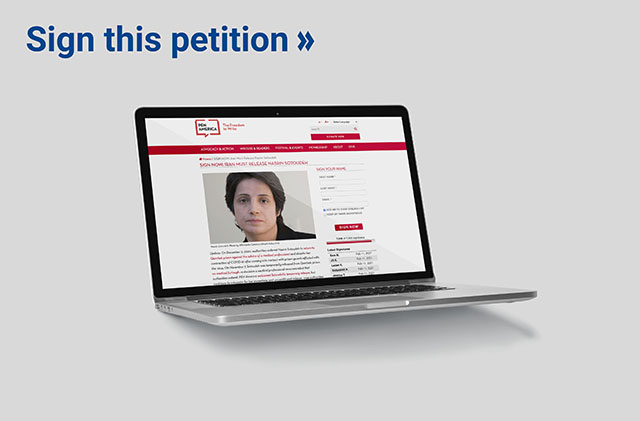Rome, The Hague, Wellington
On 6 April 2021, the New Zealand Parliament and Parliamentarians for Global Action, co-organized a critical event to support and advocate for the immediate and unconditional release of Iranian human rights defender, Nasrin Sotoudeh.
Following the great interest received from the event hosted by PGA and The Raoul Wallenberg Centre for Human Rights in support of Nasrin, Ms. Louisa Wall, Inter-Parliamentary Union New Zealand Chairperson and PGA member, convened, in a hybrid-modality, a live panel discussion where a group of experts discussed how Parliamentarians can champion human rights defenders, protect and realize human rights, and hold governments to account. The meeting was followed by the screening of the Documentary Film Nasrin for Members of Parliament, parliamentary staff, and other interested stakeholders at the New Zealand Parliament Theatrette.
Filmmakers Jeff Kauffman and Marcia Ross highlighted the importance of this event, given that, after been granted a temporary leave of absence from prison on the occasion of the Persian New Year, Nasrin was moved back to jail a few days ago. This particular circumstance made this event timelier than ever. Before introducing two short video clips where Prof. Irwin Cotler and Hon. Rozaina Adam, MP (Maldives), discussed concrete actions and steps that legislators can take to support at-risk human rights defenders and protect democracy, PGA’s Secretary-General, Dr. David Donat Cattin, expressed the profound significance of advocacy efforts in support of Nasrin, as she, a tireless human right defender, has “shined a light on the fight for women and children’s rights in Iran.”
With a prerecorded but moving intervention,Nasrin’s husband - Mr. Reza Khandan -, tackled the human rights conundrum in Iran and the struggle that women defenders face within the country, especially those like Nasrin who have devoted their lives to defending children, religious minorities, and challenged oppressive and abusive laws. In this respect, PGA Member and Iranian refugee Ms. Golriz Ghahraman MP (New Zealand) provided a unique perspective on the debate on human rights in the country. As well articulated by Ms. Ghahraman, despite having a regime that has been “painting an image which does not correspond to the reality, human rights, democracy, and the Rule of Law, are principles well-embedded in the Iranian values and need to be respected.” However, she also stressed that the change must come from the constitution and political will.
To conclude a fruitful conversation, Mr. Paul Hunt, Chief Human Rights Commissioner, who virtually joined from Auckland, acknowledged that the global human rights movement is in crisis. He argued that the Universal Declaration of Human Rights in 1948, which was animated by a profound sense of equality, had a holistic approach and other dimensions which have lost their essence with time. While urging the New Zealand government to take a leadership role in the protection of human rights defenders, Mr. Hunt gave the audience a reason to stop and ponder: “human rights for all, but all human rights, not human rights cherry-picking.”



